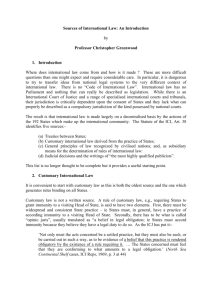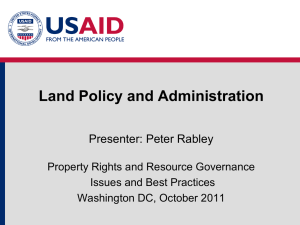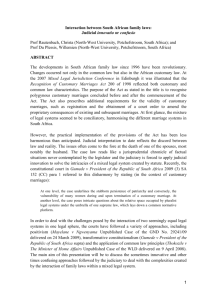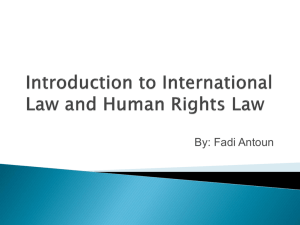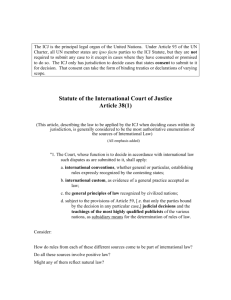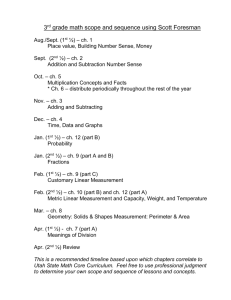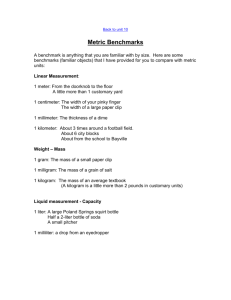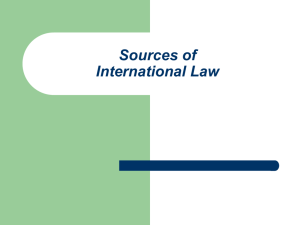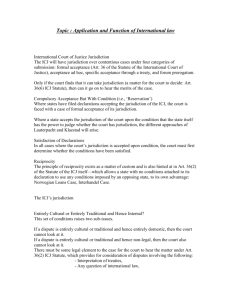The Republic of Nicaragua v. The United States of America
advertisement
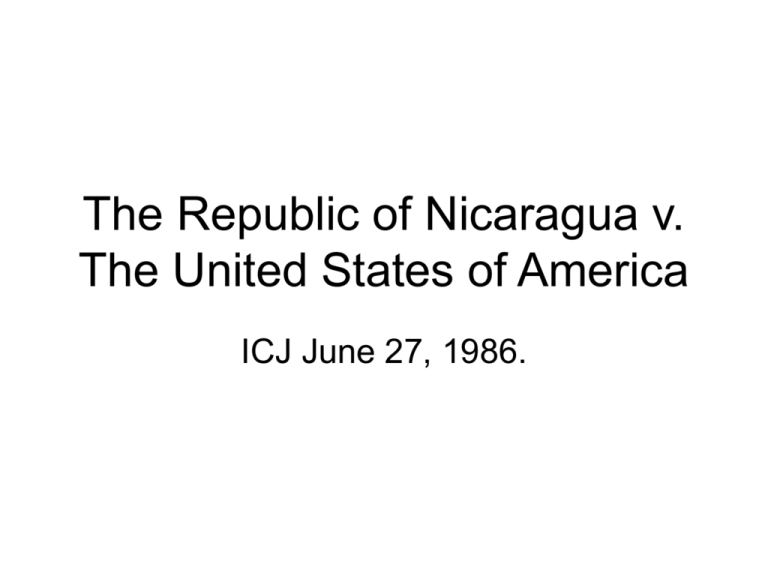
The Republic of Nicaragua v. The United States of America ICJ June 27, 1986. The facts • July 1979 • 1981 • 1983 • 1984 • 9 April 1984 Sandinista government in Nicaragua Nicaragua supported armed groups in El Salvador USA fund for the Contras USA laid mines in Nicaraguan ports; infringement of Nicaraguan air space; economic measures against Nicaragua Nicaragua’s claim at the ICJ The facts Arguments – Nicaragua: • Violations of treaty obligations (supplying military paramilitary actions) • Violations of international law (sovereignty, use of force, intervention) • Reparations The facts Arguments – USA: • Nicaragua supported armed groups • Cross border military attacks • Collective self defence Why Customary Law was Important in this Case • Before evaluating the case on the merits, the Court had to decide whether the U.S. reservation stripped the Court of its jurisdiction. • The reservation excluded from Article 36 of the Statute of ICJ “disputes arising under a multilateral treaty, unless (1) all parties to the treaty affected by the decision are also parties to the case before the Court, or (2) the United States of America specially agrees to jurisdiction.” Why Customary Law was Important in this Case • The Court concluded that the reservation is applicable in this case because – U.S. did not specially agree to the jurisdiction in this case, and – Parties to the treaty affected by the decision were not all parties before the court. Parties to the dispute included United States and Nicaragua. However, U.S. claimed it was acting in collective self-defense on behalf of El Salvador. El Salvador was not a party before the Court. The Court determined El Salvador would be affected by its judgment. Why Customary Law was Important in this Case • As a result, the Court determined that the reservation barred it from applying the multilateral treaties to this case. • But the Court did not stop there, however. • The Court viewed the reservation as a limitation on the type of law that the court could apply (multilateral treaties), not as a limitation on its overall jurisdiction to hear the case. • Thus other sources of law under Art. 38 of the Statute of the ICJ were still applicable, including customary international law. Why Customary Law was Important in this Case • U.S. argued that customary rules whose content is identical to that of the treaties cannot be applied due to the U.S. reservation. • The Court rejected this and held that just because a treaty incorporates customary international law, it does not deprive the customary law of its applicability distinctly from the treaty. • Thus according to the Court, treaties and customary law have independent existence and apply separately, even when both deal with the same subject matter. Why Customary Law was Important in this Case • Court states “. . . Even if the customary norm and the treaty norm were to have exactly the same content, this would not be a reason for the Court to hold that the incorporation of the customary norm into treaty-law must deprive the customary norm of its applicability as distinct from that of the treaty norm . . . . More generally, there are no grounds for holding that when customary international law is comprised of rules identical to those of treaty law the latter “supervenes” the former, so that the customary law has no further existence of its own.” I.C.J. Reports 1986, p. 94-95, para. 177 (emphasis added). Why Customary Law was Important in this Case • Example: If two States (A and B) are subject to a bilateral treaty and State A breaches, State B would no longer be obligated to comply with that treaty. However if there was also customary law applicable to the situation, the two States would still have to abide by it, independently of the treaty. Which rules of customary international law were addressed in the case? • Not to intervene in the affairs of another State. • Not to use force against another State. Art. 2(4) UN Charter • Right to self-defence. Art. 51 UN Charter • Not to violate its sovereignty. • Collective counter-measures in response to conduct not amounting to armed attack. Opinio Juris and State Practice • Once the Court had decided to apply customary law, it had to ascertain which rules of customary law were relevant to this case. • Therefore, the Court considered whether a customary rule exists in the opinio juris of States, and satisfy itself that it is confirmed by practice. • It is important to really check the material of customary international law in the actual practice and opinio juris of States. It doesn’t matter if these rules have already been collected by several treaties or any other intruments. Opinio Juris and State Practice • The Court also noted that both Nicaragua and US had a considerable degree of agreement as to the content of the customary international law related to the non-use of force and non-intervention. • But, the fact that States declare their recognition of certain rules is not sufficient for the Court to consider these as being part of customary internt. law and as applicable as such to those States. The Court must not disregard the rol played by “general practice”. The Court must satisfy itself that the existences of the rule in the opinio juris of States is confirm by practice. Opinio Juris and State Practice • Thus, the Court held that the attitude of the parties and States towards certains General Assembly Resolutions could be indicative of opinio juris. (189. As regards the United States in particular, the weight of an expression of opinio juris can similarly be attached to its support of the resolution of the Sixth International Conference of American States condemning aggression (18.02.28) and ratification of the Montevideo Convention on Rights and Duties of States (26.12.33). • Controversy: Some scholars say that the Court should first look to state practice and not to opinio juris. And since the Court in this case looked to opinio juris without emphasizing state practice, it got it backwards. Opinio Juris and State Practice • Some others say that it is not normally even necessary to prove the existence of opinio juris when you have firm evidence of state practice. In the Nicaraguan case the ICJ demanded very little evidence of actual state practice, where it saw clear evidence of opinio juris. It found evidence of opinio juris by looking to the General Assembly resolutions. (Int. Law Association – London Conference 2000) • If there is enough evidence of state practice, opinio juris is not always necessary, and usually if it does exist, courts use it only to confirm the existence of state practice as indicative of customary law. • But, where there is little evidence of state practice, court will make up for that with greater evidence of opinio juris and vice versa. How the ICJ Address State Practice and Opinio Juris 1. Use of Force • Party Agreement • General Assembly Resolution 2625 (XXV) • Resolution of The Sixth International Conference of American States Concerning Aggression 18 Feb 1928 • Montevideo Convention on the Rights and Duties of States 26 December 1933 How the ICJ Address State Practice and Opinio Juris 2. Self Defence • Party Agreement • UN Charter Article 51 • General Assembly Resolution 2625 (XXV) • General Assembly Resolution 3314 (XXIX) • Charter of Organisations of American States • International Treaty of Reciprocal Assistance 1947 How the ICJ Address State Practice and Opinio Juris 3. Non-intervention • Numerous declarations and resolutions • Corfu Channel (Merits) United Kingdom v Albania 1949 ICJ Reports 4 How the ICJ Address State Practice and Opinio Juris 4. Collective counter-measures in response to conduct not amounting to armed attack • Counter-measures is an exemption of non-intervention principle; • Counter-measures is analogous to the right of selfdefence in the case of armed attack; • ICJ: “armed attack must be understood as including not merely action by regular armed forces across an international border, but also ‘sending by or on behalf of a State of armed bands, groups, irregulars or mercenaries, which carry out attacks of armed force against another State of such gravity as to amount to an actual armed attack conducted by regular forces, or its substantial involvement therein.” How the ICJ Address State Practice and Opinio Juris 5. State sovereignty The concept of sovereignty extends to the internal waters and territorial sea of every State and to the airspace above its territory: – Art. 2(1) of the UN Charter; – Art. 1 of the Chicago Convention on International Civil Aviation (1944); – Geneva Convention on the Territorial Sea (1958); – UN Convention on the Law of the Sea (1982). – Laying of mines by another State is infringement of the freedom of communications and of maritime commerce. How the ICJ Address State Practice and Opinio Juris 6. Humanitarian law • A breach of the principles of humanitarian law underlying the specific provisions of Hague Convention (Art. 3 and 4); • United States commited violation of Art. 3 of the fourth Geneva Convention; • The conflict between Contras forces and those of the Government of Nicaragua is an armed conflict which is "not of an international character"; • Obligation on the United States Government, in the terms of Art. 1 of the Geneva Convention is to "respect" the Conventions and even "to ensure respect" for them "in all circumstances" (general principle of humanitarian law) How did the ICJ address differences in opinion regarding the content of the substantive rule(s)? • The court found in its legal verdict that the US was “in breach of its legal obligations under customary international law not to use force against another state”, “not to intervene in its affairs”, “not to violate its sovereignty”, “not to interrupt peaceful maritime commerce”, and “in breach of its obligations under Article XIX of the Treaty of Friendship, Commerce and Navigation between the Parties signed at Managua on 21 January 1956”. • It said that it was not necessary that the practice in question had to be “in absolutely rigorous conformity” with the purported customary rule. How did the ICJ address differences in opinion regarding the content of the substantive rule(s)? • The court continued: In order to deduce the existence of customary rules, the court deems it sufficient that the conduct of states should, in general, be consistent with such rules, and that instances of state conduct inconsistent with a given rule should generally have been treated as breaches of that rule, not as indications of the recognition of a new rule. • If a State acts in a way that is incompatible with a recognized rule, but then defends its action by trying to appeal to an exception to that rule, then whether or not the State's conduct is in fact justifiable on that basis, the significance of that attitude is to confirm rather than to weaken the rule.
